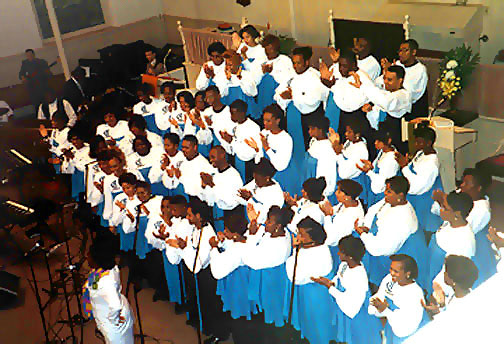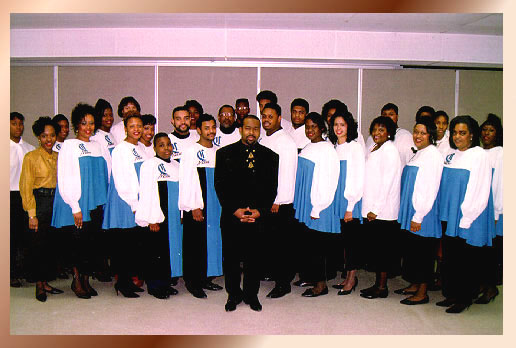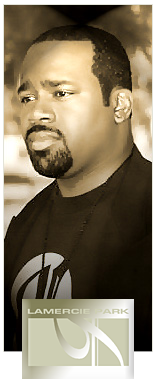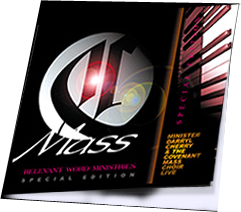
Sold Out
At a
spring staff meeting for the Covenant Mass Choir, my close
friend Minister Darryl Cherry announced his plans to record a
live concert album. At that point, Covenant had recorded a
couple of demos and assisted other artists but had never
attempted anything this ambitious. I think I stifled a quick
smirk, wondering how Covenant, an 85-voice choir which barely
broke even financially in terms of travel costs and choir robes,
would afford to do a live recording. But Darryl put the project
in the hands of the Lord, and in the early fall, the event came
to pass.
Darryl worried that people might not come. Actually, Darryl
worries about most everything and thinks things through to the
most microscopic detail, which, I suppose, is why we get along
so well. With the coming of age, midriff spread and all, I’ve
learned to take most things in stride, but Darryl is a worrier.
He wanted everything to be perfect and my job was to help him
do his job. The division of labor was pretty simple: Darryl's
focus was largely creative. Mine was largely technical: how to
get Darryl's vision on tape. Darryl would work on producing the
best music he could, I would worry about capturing that magic.
Whose name came first, a real non-issue for us, is based on what
you're talking about. If you're talking about the creative end
of production, Darryl's name comes first. If you're talking
about the technical end of production, mine does. At this
meeting, it was decided that Leslie Noah Burns, a respected and
popular manager, would run the house while I ran the mobile
truck. This freed Darryl to do what he does best: create and
minister.
The first thing I did was fire the musicians, starting with
myself. Of course, the loyal thing to do is to allow your road
crew to play on the record— I mean, they earned it, right? But,
I urged Darryl to think like a producer and produce the best
album he can, not the best album he can with the band he travels
with. So, the band got fired, starting first and foremost with
me. I opted out of the bass slot and hired two
studio players I'd worked with over the last few years, Derek
Jackson and Gregg Sullivan, to play bass and guitar,
respectively, on the record.
Darryl liked Derek immediately. I’m not sure I ever picked up a
bass again for Covenant after Derek signed up. The fact was,
Darryl is an exemplary player and needs to surround
himself with exemplary players, while I and most of his road
crew were competent journeymen at best. Derek was a tiger,
and he loved Darryl’s material. Derek’s warmth and outrageous
sense of humor sustained us on many road trips and through many
interminable waits backstage.
Gregg, Darryl was less enthused to meet. He didn’t seem to
understand the relevance of the guitar in Gospel music, or why
one player would be markedly better or different from another.
Covenant already had a guitar player, an incredibly loyal and
talented school teacher named Henry Terrell. But Darryl needed a
guy who could not only keep up with Darryl, but at times mop the
floor with him.
As was our custom, I badgered and browbeat Darryl about Gregg
until Darryl reluctantly gave in. Gregg appeared at the next
rehearsal, and Darryl walked into a rundown of my arrangement of
the intro to Covenant, which we’d planned to open the show with.
Gregg was wailing away in full Jimmy Hendrix distort mode (which
I coaxed him to do), and the look on Darryl’s face— that
classic, “Did I Miss A Meeting?” squint known all over the East
Coast— was priceless. Darryl ultimately cut this rock intro from
the album for both time and space reasons. But, at the show,
I’ll never forget the stunned reaction of the audience as the
band kicked into this wailing, plaintive howl to the Lord, led
by a gleeful Sullivan banging away as the choir marched in. It
was unheard of. It bordered on sacrilege. No one in that
building full of Cherry aficionados— many of whom had grown up
listening to this man play every week— expected to hear that
sound. It was a musical punch in the face that announced, “I
Have Arrived.” New Brunswick would no longer have Darryl Cherry
to kick around anymore. The Gregg Sullivan-fueled Wall of Sound
was the loudest and most profound statement of Darryl’s career
to date, and it left everyone gasping to see what would come
next. So, I was right about Gregg. I love being right.
The house was nearly sold out. The only seats left in the old
Methodist Church on Albany Street in New Brunswick were up in
the balcony, with a view of the tops of everyone’s head. We had
problems with the sound check and weren’t able to open the doors
as scheduled. A crowd had formed outside— a crowd of Church
Folk, not known for their patience or understanding. The guy we
rented the Hammond B3 organ from left the power cord in Bristol,
Pennsylvania, nearly an hour drive away. Darryl started pacing
the floor, anxious about the sound guys and what was taking so
long. The problem was what sound engineers call bleed: different mics picking up reflected sound from other sources. It was an
enormous task to get all the instruments right and get their
monitors right. To get the choir monitors hot enough that the
choir could exist within a kind of sound cocoon where they could
hear themselves clearly and cleanly over the band. And
everything had to be reasonably isolated so we got twenty-four clean
tracks out to the remote truck.
So, things were taking longer than Darryl expected. The crowd
outside was getting agitated. It was starting to rain. I told
Darryl to relax. I told him to go outside and talk to the
people, let them know what was going on. Darryl didn’t want to
go. He thought he'd be mobbed, beaten and dragged out into
traffic. So I went with him along with a security guard. A
nervous Minister Cherry, head bowed slightly with a kind of Nixonian gape, ventured outside, thinking to find 20 or 30
people.
He found a mob. At least 200 people waiting in the rain to see
him and to see this choir. There was a crush of people outside
the doors, along the sidewalk and into the street. And, rather
than receive anger from these people, they received Darryl in
love, with hugs of reassurance, pats on the back and smiles.
Darryl thought the night was going to be a fiasco, that it would
be his last day in New Jersey. But, in spite of his lack of
faith, God brought the souls out. And Darryl and the choir
delivered in spades.

Never Stop Recording
I deliberately left some of Sister Miller’s pre-show rap
on because I believe this album can and should, first and
foremost, minister to the listener. Sure, with What's Wrong Out
There? and Darryl’s sermonette, The Recording Is Secondary, a
full five minutes passes before Darryl plays a single note on
the album. But its five minutes invested in recreating the
tension, the expectation, and the invocation for the choir and
setting the stage of what was to come, “Dennis, you do whatever
you have to do— we’ve come to magnify the Lord.”
Those were Darryl's explicit instructions: this was, first and
foremost, a worship service. Yes, we were going to attempt to
get the best takes of things that we could, but once the
performance began, all thoughts of a recording session were to
be banished and the flow of the service was not to be disturbed
for any reason.
Out in the remote truck, I was giving the engineer cues about
when to switch reels and what was next, but we were basically
collecting raw footage we’d edit later. I put in several
miles of running from the truck to the band pit (a circuitous
path that led up a back stairway, over the pulpit and down into
the band pit), as I cut back and forth during the night to
either communicate with the band or, on two songs, play bass.
Make A Joyful Noise, a celebratory R&B romp, was Covenant’s
signature song, so it was fitting to open the concert with this
(the before mentioned Covenant was used as a processional).
Driven by Derek’s funky inharmonic zigzagging forced against
Darryl’s straight-ahead major chords, the two formed a kind of
dissonant thunder that drove the choir, and, by extension, the
congregation, into a frenzy. The late and dearly loved Seth
Morrison, a good friend of Darryl's brought in for the concert,
improvised TV game show horn riffs over the melody that,
frankly, really should not have worked. I mean, they were corny,
cartoonish (and Seth reportedly braced at my characterization of
his arrangements. I mean them as the highest compliment to this
brilliant musician). But they really rocked the house and
brought an added dimension to a song we had, by that time, been playing for
nearly two years.
Turn Your Life Over To The Lord is one of Darryl’s favorite
songs, one imbued with Darryl’s trademark funky-pop fusion.
Darryl loved to play that song, which was also fun for the bass
guy, and again, the choir flattened the congregation with this
George Clinton-esque slammer. This song evolved out of several
fun rehearsals, with Darryl adding the ominous Vincent Price
warning before we looped into an extrapolation of TSOP's classic
Love Is The Message. Now turbo-charged by Special Edition
vocalist Jacqueline Williams' brassy alto, Darryl and I coached
an aggressive accusation out of the diminutive Williams who
coalesced this drive as guitarist Sullivan's bluesy Clapton
riffs hammered home the moral imperative of a personal
relationship with Christ.
He Is Holy is a song that requires, no demands, a lot of time.
Like the gorgeous Covenant, Holy tells a tale and takes its
sweet time telling it. It unravels slowly and is not for the
impatient. Though Darryl and I decided to put this cut third on
the album, it came much later in the program, after Darryl and
the choir had worn everyone out enough that they might actually
sit and listen and let He Is Holy do its work. He Is Holy is one
of the most powerful, beatific praise ballads ever written. Yeah, I
know I’m saying a lot, here, but the song’s power is undeniable.
It is an incredibly moving worship experience that cannot be
rushed, and here the choir shines as nowhere else on the album.
Songs of Praises, absent from this Special Edition, was Darryl’s
award-winning arrangement of a classic anthem. Directed by the
incredibly gifted and dynamic Joe Lee, this anthem— which I
feared would be icily ignored by the predominately black and
predominately slap and stomp crowd— brought the church roaring
to its feet with a prolonged ovation that threatened the aging
stained glass windows.
Unfortunately, Derek hadn't quite gotten the complex bass part
to Songs... and I had to scamper out of the truck, through the
rain, down the aisle, over the rainbow, and down into the pit to
play bass on the song. This is unfortunate for two reasons:
first, I'm a lousy bassist. Second: Derek's Music Man bass used
huge Humbucker active EQ pickups that the house sound and the
truck recording studio were both set up for, while my bass used
wimpy passive EQ stock Fender pickups. In other words, the bass
level dropped out of the house. I could barely hear myself, and
the diminished presence of the bass only added to my humiliation
of stumbling around in the shadow of the Elder Statesman
Jackson.
The bigger problem, though, was that I was in the musicians' pit
instead of the remote truck. The engineer picked up a squeal of
feedback and alerted the stage manger, Leslie Noah Burns, one of
the most respected and capable managers on the east coast. Since
I was not available, Leslie was who they turned to, and she
called the ball: she had them stop and rewind.
Which was against Darryl's explicit instructions: you never
stop. You tape everything. You keep going. In these days of
digital transfers and ProTools, we can recreate most anything in
a virtual environment. We could have fixed whatever went wrong
after the fact. This marvelous, whiz-bang system only has one
basic flaw, however: the tape MUST KEEP ROLLING. If we have no
raw footage, we can't fix anything. We could have gone another
take and used the second, less-enthused performance to patch
the first, outstanding performance. But, Leslie did what she
thought best, and we lost the take of the first performance of
this song, a performance that threatened to stop the entire show
and left people weeping and spent. The second time around, the
reaction was pleasant but nowhere in the same ballpark as the
first.

Chaos And Order
I'm Saved was the song. We all knew it. We knew it from the
opening bars: it was a grabber. Like the infectious bosa-nova of
Michael Jackson's Thriller, I'm Saved begins with a perilous
chromatic dive by the minister's piano into a flat punch in the
face by Derek's Music Man bass guitar. The band then settles
into a lazy, low-rider ragtop choppy groove, with Derek slipping
and sliding in and around Darryl's bang-bang-bang-bang
hammering, while the rest of the band plays understated staccato
accompaniment. I'm Saved has never failed to get people on their
feet within the opening bars of this funky old-school Earth,
Wind & Fire groove, and then the thing takes off like a freight
train, with a procession of male leads, each more beguiling than
the next. The song runs well over thirteen minutes and I begged Darryl
to leave it intact, but Darryl, as is his wont, worries over
taxing the patience of the listener. This seems wasted effort on
the minister's part as this toe-tapper steams along
effortlessly, obliterating all concerns of time and space as it
dives deeper and deeper and deeper into the blue velvet, only to
emerge with the triumphant bark "SAVED!!" from the choir, into
an irresistible call-and-response: Gotta believe it, gotta
receive it, as long as you need it...
I'm Saved is Darryl's crowning achievement, a song he will
undoubtedly become sick of playing long before anyone gets sick
of hearing it. Especially if gifted, brilliant tenors like
Jonathan "Dusty" Hall line up to take the lead. "Dusty," as we
called him (and he called himself) was a kind of local celeb, a
young man with a velvet croon that left most every woman in town
weak-kneed. As he approached the stage, cheers and yelps from
the soprano section are clearly audible (despite Darryl's wasted
effort to get rid of them), as the women inappropriately swooned
in the middle of a worship experience. Darryl himself was caught
unawares by the causality of Dusty's opening bid: Gotta believe
it— yes, you do... with a casual, check-my-watch timing that
elicited a squeal of delight from Darryl himself, as Dusty, New
Brunswick's own Velvet Fog, slid into some dazzling vocal
calisthenics that brought the crowd to its feet. This was an apt
capping to the two other powerhouse lead tenors that preceded
him.
This Special Edition marks a rapid departure for this song, one
so traditionally male-led that Darryl refused to allow R&B
singer Faith Evans to sing it the night of the concert. We
didn't know Faith that well, and this was some time before she
became nationally known, but she had been a frequent visitor to
rehearsals and a participant with the choir, and Faith Evans had
sung I'm Saved in rehearsal. But, Darryl felt this was an
exclusively male song, so he declined to have Faith sing that
night (one of those moments he dearly regrets).
So, I was pleasantly surprised when Darryl seemed open to my
suggestion for using a female lead on this song for the Special
Edition. Nicole Cates, a dynamic and fiery alto with serious R&B
and gospel chops, takes the reins on the song's bridge— a wholly
unexpected sound to people familiar with this song. Nicole mixes
it up with major-league heavyweights Josiah Martin (a David
Ruffin-style baritone with a battle-scarred and weather beaten
howl far older than his late teen years suggest) and Steve
Frazier, the Springs' favorite son. Steve memorized Dusty's solo
the first time he heard it, long before Pastor Promise Lee had
even conceived of this Special Edition. He nailed his part on
the first take and created a dynamic tapestry of Nicole, Josiah,
Steve and Dusty.
Finally, Darryl himself takes the lead in a brief coda to
...Saved, realizing the choir itself had now left him on his own
as they rejoiced and celebrated and wept with joy, overcome by
the move of the Holy Spirit. Rather than sit politely and wait
for everyone to calm down, Darryl's tactile tenor began a kind
of lullaby of the call-and-response in a soothing, worshipful
manner, while he quieted his own keyboard pyrotechnics to a
simple phrase, leading the congregants in worship. The band fell
in, downshifting from the roar of Aerosmith to the hush of Erykah Badu, in a
completely unrehearsed Caribbean swing arrangement as Darryl brilliantly brought the train
into the station.
Pentecost seems to be Darryl's favorite song of this set. I
don't know why. To me, it sounds the least like Darryl Cherry.
To me, it sounds like a great Gospel foot-stomper, while
Darryl's original songs have an indefinable something; an
amalgam of classical, jazz and Gospel forms that, honestly, does
not sound like anyone else. Darryl sounds like Darryl except here, where he sounds like Dorothy Norwood
or Albertina Walker. Which is fine, I suppose, but I never liked
this song much, and never understood why Darryl insisted on
playing the hell out of it everywhere we went. On the other
hand, Pentecost was universally well received, and was a
sure-fire show-stopper. It was a breath of stylistic familiarity
amidst Darryl's otherwise progressive and ingenious material,
most of which went well over the heads of your average Church
Folk.
In post production, Darryl shocked everyone by bringing in a
piano player. Most everyone, myself included, found this odd
because, well, Darryl is one of the best Gospel piano players
breathing today. But if Darryl brings in a piano player, you can
be sure this guy is a monster. James Perry was that guy, a
legendary Gospel sessions man with whom Darryl served in music
ministry in Newark, New Jersey. Darryl produced new piano tracks
for Pentecost with James ripping all over the keyboard and overdubbnig a B3 organ part as well.
For The Special Edition, I chose to keep both performances:
Darryl's spirited electric piano drives the song through the
verse and chorus, and James explodes on the scene in his Yamaha
concert grand right after the I Got It! holler. Both men then
battle it out, with Darryl primarily in the left speaker and
James primarily in the right, a kind of frenzied piano duel like
nothing I've heard in Gospel music in years. After the song
ends, about six minutes into the track, Perry surges forward
with a dynamic solo as the band descends into chaos as the choir
and the congregation spontaneously explode into rejoicing and
dancing. Following Perry's solo, Darryl re-takes the lead and
drives the song even higher with his own blazing keyboard work.
Here lead vocalist Debra Darby simply rips your head off with
her fiery soprano, exploding in frequent squalls of reverence
and rage as she drives the choir into an absolute frenzy. Darryl
added to this Jacqueline Williams' conviction and, well,
stamina, as her alto traded jabs with Debra's explosive
performance.
Bonus clips of studio cuts, produced solely by Darryl, include
Anoint Me The More, What A Fellowship and
the title track from Darryl's studio album Let Your Spirit Fall. Darryl
originally wanted to include studio cuts here on Covenant Live,
but I urged Darryl to leave them off. Covenant Live is a unique
moment in Darryl's life, one that speaks entirely for itself. He
has more than enough material for two albums, so I reasoned, why
shortchange both by cramming too much onto this one?
Anoint melds nicely out of Darryl's quiet coda to I'm Saved, and
paves the way nicely for the smooth, ergonomic
What A
Fellowship, a silky workout appropriate for worship services and
romantic dinners, fueled by an impossible philharmonic piano
riff Darryl hypnotically winds through the song. Let Your Spirit
Fall is a David Bowie-esque hand-banging funk march fueled by
Phil Miller's rigidly timed, ear-crushing piccolo snare drum,
each hit sounding like a shotgun blast as the choir stair-steps
their way through a chromatic maze of diminished minor chords
mechanically clanking against each other in an almost New Wave
stylistic departure.
This was truly anointed writing, playing, and singing, written,
produced and arranged by a masterfully gifted and anointed
musician.
Christopher J. Priest
January 2000 UPDATED OCTOBER 2013
Home | Blog | Projects | Comics | Rants | Music | Video | Christian Site | Contact
Unless otherwise specified, Copyright © 2013 Lamercie Park. All Rights Reserved.
TOP OF PAGE




